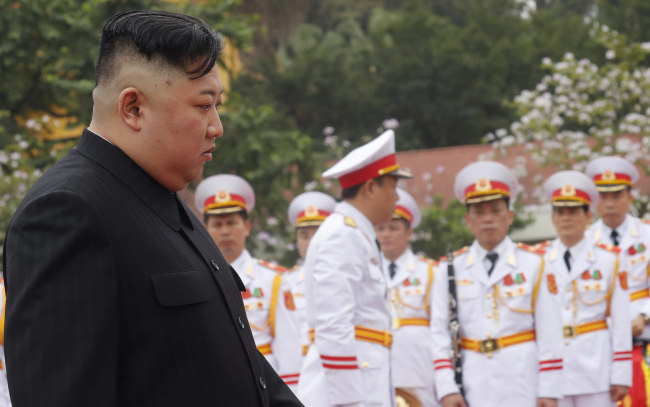Denuclearization of North Korea is once again in question, with the US-North Korea summit in Hanoi being cut short without reaching an agreement.
While the developments at the summit took the world by surprise, the underlying reasons that led to the outcome are unchanged -- the North wanting more for less, and the US wanting Pyongyang to give up more, quickly.
 |
North Korean leader Kim Jong-un attends a wreath laying ceremony at Monument to War Heroes and Martyrs in Hanoi, Vietnam Saturday. (AP-Yonhap News) |
At a press conference Thursday, Trump said that an agreement was not signed due to the North demanding an end to all sanctions.
According to a senior US Department of State official speaking on condition of anonymity, the North had demanded the lifting of all sanctions with the exception of those regarding armaments.
North Korean Foreign Minister Ri Yong-ho stated that the sanctions his country had asked to be lifted concerned the civilian economy and the people’s livelihood, in an apparent effort to refute Trump’s claims, but the US says the North’s demands had much wider implications.
According to the State Department official, the North offered the Yongbyon complex in return, without clearly defining the facilities and organizations that the North intended to dismantle.
The offer, combined with the North’s reluctance to accept US conditions made it clear that “North Koreans at this point are unwilling to impose a complete freeze on their weapons of mass destruction programs,” the official said.
The official was also quoted as saying that with the situation standing as it does, lifting any sanctions “would in effect put us in a position of subsidizing the ongoing development of weapons of mass destruction in North Korea.”
The official also elaborated that Trump had asked Kim to do more, in return for more from the US, but the idea was rejected.
As for North Korea, what the US offered is likely to have been insufficient, or not quite aligned with its objectives, experts say.
“Trump spoke much about the economic development North Korea will enjoy if denuclearization is achieved, but Kim doesn’t appear to have been persuaded by this,” Paik Hak-soon, president of Sejong Institute, said at a forum in Hanoi.
“I think perhaps imposing (the idea) that North Korea will have a bright economic future after denuclearization, while the US is not providing North Korea with meaningful sanctions relief, was not persuasive.”
Despite the failure of the summit to produce the much-anticipated “Hanoi Declaration,” both Pyongyang and Washington have said that negotiations will go on and that the summit was productive.
Following the summit, US Secretary of State Mike Pompeo stated that the two sides now have a clearer understanding of the situation and that their working-level teams are in a better position to negotiate.
Some experts say developments in Hanoi will have little impact on the position of the US and its allies in dealing with the North.
“Kim Jong-un needs this to work out -- we don’t. We could go on indefinitely like this. We have all the cards, we have plenty of time, our economy is not being stressed, out security is not at risk because out deterrence keeps us safe no matter what happens,” Daniel Davis of the think tank Defense Priorities told The Korea Herald.
He added that due to such factors, Trump was “not played” by Kim and that the US position on the issue remains as strong as ever.
He went on to say that he believes both leaders went into the talks “ready to walk,” meaning they were unwilling to compromise, but that unlike Trump, Kim cannot maintain the strategy for long.
“Kim Jong-un, now, he is going to go back and the sanctions are not going to be lifted, and so his economy is going to continue to suffer; he can’t do what he wants,” Davis said, adding “when the pain gets enough, Kim Jong-un has to go back to the table.”
Reemphasizing that it is the North that has an urgent need to reach a deal, not the US, Davis said that it was a “good, smart decision” on Trump’s part not to make a deal, but Kim may have weakened his position.
“Kim Jong-un needs a deal, and now it’s probably going to cost more, to get the same thing he could have gotten today.”
By Choi He-suk (
cheesuk@heraldcorp.com)








